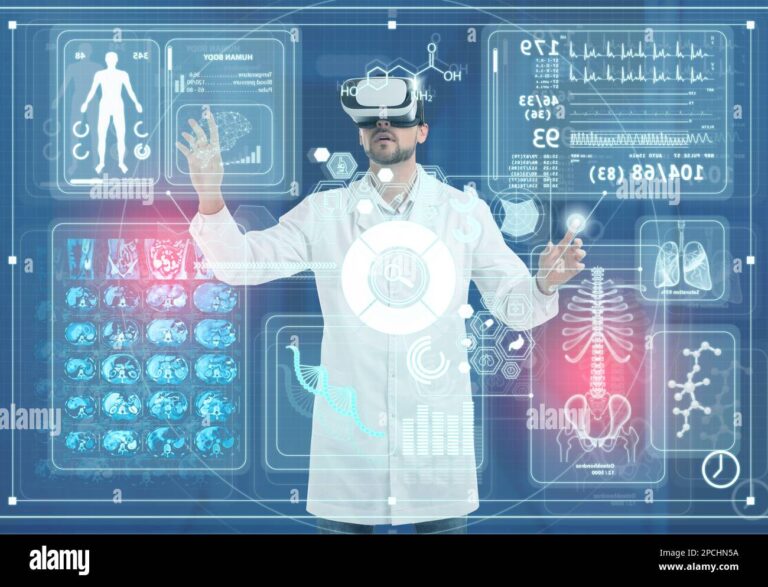The integration of artificial intelligence (AI) into healthcare is transforming the landscape of medical diagnostics and therapy. This technological revolution is not just a fleeting trend but a fundamental shift in how healthcare providers approach and administer care. With its unparalleled precision and efficiency, AI is setting new standards in diagnosis and therapy, promising a future where health care is both personalized and predictive. Here’s how AI is reshaping the healthcare sector, particularly in the UK and across the EU.
Revolutionizing Diagnostics with AI
Artificial intelligence is making significant strides in the field of medical diagnostics. AI algorithms can analyze complex medical data at a speed and accuracy that humans cannot match. This capability is particularly transformative in areas like radiology and pathology, where precise imaging analysis is crucial.
For example, AI-powered systems can scan thousands of medical images to detect anomalies such as tumors and fractures faster and more accurately than ever before. In the UK, where the NHS faces immense pressure, AI tools like these can help alleviate workload on medical professionals and reduce waiting times for users.
Moreover, AI’s ability to integrate and learn from various data sources enables early diagnosis of diseases such as cancer and cardiovascular disorders, often before they manifest any scientific symptoms. Early detection is crucial for effective therapy and can significantly enhance user outcomes.
Enhancing Therapy Precision
AI’s role extends beyond diagnostics into the realm of therapy. By analyzing vast amounts of medical literature and user data, AI can assist health professionals in creating personalized therapy plans. This is particularly vital in the therapy of complex diseases like cancer, where AI systems can suggest customized drug combinations based on the genetic makeup of the user’s tumor.
In critical care scenarios, AI algorithms are being used to monitor users and predict health deteriorations before they occur. Systems equipped with AI can analyze real-time data from ICU monitors to alert staff about potential critical issues like sepsis, which requires immediate intervention to save lives.
Improving Access to Care
AI is also democratizing healthcare by making high-quality diagnosis and therapy accessible to underserved regions. Telemedicine, powered by AI, allows health professional to diagnose and treat users in remote areas without the need for physical travel. This is especially relevant in the EU, where rural areas often lack the same level of access to specialist healthcare as urban centers.
Furthermore, AI-driven chatbots and virtual health assistants are providing 24/7 healthcare support. These tools can answer health-related queries, provide basic healthcare advice, and even help manage chronic symptoms by reminding users to take their medications.
Challenges and Ethical Considerations
Despite its benefits, the integration of AI in healthcare is not without challenges. One major concern is data privacy and security. Healthcare data is incredibly sensitive, and as AI systems require vast amounts of data to learn and function effectively, ensuring this data is protected is crucial. Regulations such as GDPR in the EU strictly govern how personal data, including health data, must be handled, providing a framework to address these concerns.
Another challenge is the ethical use of AI. Decisions regarding users care are deeply personal and can have significant consequences. It is vital to ensure that AI systems are used to support, not replace, the human element of healthcare. This involves continuous monitoring and evaluation to ensure AI systems do not develop or perpetuate biases which can influence users care.
The Future of AI in Healthcare
Looking forward, the potential of AI in healthcare is vast. Ongoing advancements in AI technology promise even more innovative applications, such as using AI for genetic sequencing and personalized medicine. The UK and the EU are at the forefront of this innovation, investing in research and development to ensure AI is used effectively and ethically within healthcare.
Conclusion
AI in healthcare is more than just a technological advancement; it is a pivotal transformation that enhances how care is delivered, diagnostics are performed, and therapies are administered. By improving precision in diagnostics and therapy, AI not only enhances the efficiency of healthcare services but also improves user outcomes. As we continue to harness the power of AI, it is imperative to navigate the ethical and practical challenges it brings. The future of healthcare, empowered by AI, promises to be more inclusive, effective, and innovative, fundamentally changing the way we approach health and medicine in the UK and beyond.



